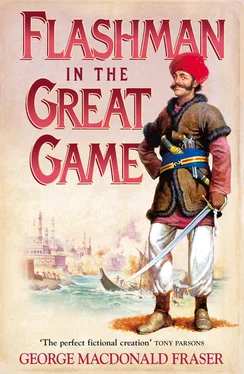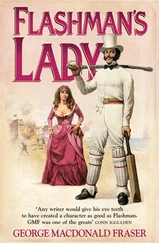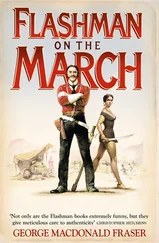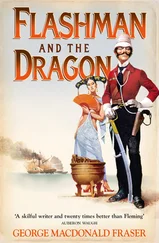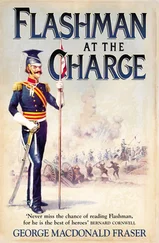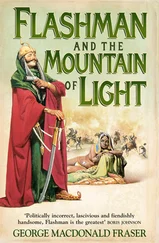‘You have a gift to present,’ says she, speaking in a quick, soft voice which had me recollecting myself and clicking my heels as I presented my packet. She took it, weighed it in her hand, still half-reclining in her swing, and asked sharply: ‘Why do you stare at me so?’
‘Forgive me, highness,’ says I. ‘I did not expect to find a queen who looked so …’ I’d been about to say ‘young and lovely’, but changed it hurriedly for a less personal compliment. ‘So like a queen.’
‘Like that queen?’ says she, and indicated the picture of Vicky and Albert, which was lying on a cushion.
‘Each of your majesties,’ says I, with mountainous diplomacy, ‘looks like a queen in her own way.’
She considered me gravely, and then held the packet out to me. ‘You may open it.’
I pulled off the wrapping, opened the little box, and took out the gift. You may smile, but it was a bottle of perfume – you see, Flashy ain’t as green as he looks; it may be coals to Newcastle to take perfume to India, but in my experience, which isn’t inconsiderable, there’s not a woman breathing who isn’t touched by a gift of scent, and it don’t matter what age she is, either. And it was just the gift a blunt, honest soldier would choose, in his simplicity – furthermore, it was from Paris, and had cost the dirty old goat who presented it to Elspeth a cool five sovs. (She’d never miss it.) I handed it over with a little bow, and she touched the stopper daintily on her wrist.
‘French,’ says she. ‘And very costly. Are you a rich man, colonel?’
That took me aback; I muttered something about not calling on a queen every day of my life.
‘And why have you called?’ says she, very cool. ‘What is there that you have to say that can be said only face to face?’ I hesitated, and she suddenly stood up in one lithe movement – by Jove, they jumped like blancmanges in a gale. ‘Come and tell me,’ she went on, and swept off out on to the terrace at that end of the room, with a graceful swaying stride that stirred the seat of her sari in a most disturbing way. She jingled as she walked – like all rich Indian females, she seemed to affect as much jewellery as she could carry, with bangles at wrist and ankle, a diamond collar beneath her chin, and even a tiny pearl cluster at one nostril. I followed, admiring the lines of the tall, full figure, and wondering for the umpteenth time what I should say to her, now that the moment had come.
Pam and Mangles, you see, had given me no proper directions at all: I was supposed to wheedle her into being a loyal little British subject, but I’d no power to make concessions to any of her grievances. And it wasn’t going to be easy; an unexpected stunner she might be, and therefore all the easier for me to talk to, but there was a directness about her that was daunting. This was a queen, and intelligent and experienced (she even knew French perfume when she smelled it); she wasn’t going to be impressed by polite political chat. So what must I say? The devil with it, thinks I, there’s nothing to lose by being as blunt as she is herself.
So when she’d settled herself on a daybed, and I’d forced myself to ignore that silky midriff and the shapely brown ankle peeping out of her sari, I set my helmet on the ground and stood up four-square.
‘Your highness,’ says I, ‘I can’t talk like Mr Erskine, or Captain Skene even. I’m a soldier, not a diplomat, so I won’t mince words.’ And thereafter I minced them for all I was worth, telling her of the distress there was in London about the coolness that existed between Jhansi on the one hand and the Company and Sirkar on the other; how this state of affairs had endured for four years to the disadvantage of all parties; how it was disturbing the Queen, who felt a sisterly concern for the ruler of Jhansi not only as a monarch, but as a woman, and so on – I rehearsed Jhansi’s grievances, the willingness of the Sirkar to repair them so far as was possible, threw in the information that I came direct from Lord Palmerston, and finished on a fine flourish with an appeal to her to open her heart to Flashy, plenipotentiary extraordinary, so that we could all be friends and live happy ever after. It was the greatest gammon, but I gave it my best, with noble compassion in my eye and a touch of ardour in the curl shaken down over my brow. She heard me out, not a muscle moving in that lovely face, and then asked:
‘You have the power to make redress, then? To alter what has been done?’
I said I had the power to report direct to Pam, and she said that so, in effect, had Skene. Her agents in London had spoken direct to the Board of Control, without avail.
‘Well,’ says I, ‘this is a little different, highness, don’t you see? His lordship felt that if I heard from you at first-hand, so to speak, and we talked—’
‘There is nothing to talk about,’ says she. ‘What can I say that has not been said – that the Sirkar does not know? What can you—’
‘I can ask, maharaj’, what actions by the Sirkar, short of removing from Jhansi and recognising your adopted son, would satisfy your grievances – or go some way to satisfying them.’
She came up on one elbow at that, frowning at me with those magnificent eyes. For what I was hinting at – without the least authority, mind you – was concessions, and devil a smell of those she’d had in four years.
‘Why,’ says she, thoughtfully. ‘They know well enough. They have been told my grievances, my just demands, for four years now. And yet they have denied me. How can repetition serve?’
‘A disappointed client may find a new advocate,’ says I, with my most disarming smile, and she gave me a long stare, and then got up and walked over to the balustrade, looking out across the city. ‘If your highness would speak your mind to me, openly—’
‘Wait,’ says she, and stood for a moment, frowning, before she turned back to me. She couldn’t think what to make of this, she was suspicious, and didn’t dare to hope, and yet she was wondering. God, she was a black beauty, sure enough – if I’d been the Sirkar, she could have had Jhansi and a pound of tea with it, just for half an hour on the daybed.
‘If Lord Palmerston,’ says she at last – and old Pam himself would have been tempted to restore her throne just to hear the pretty way she said ‘Lud Pammer-stan’ – ‘wishes me to restate the wrongs that have been done me, it can only be because he has discovered some interest to serve by redressing them – or promising redress. I do not know what that interest is, and you will not tell me. It is no charitable desire to set right injustices done to my Jhansi—’ and she lifted her head proudly. ‘That is certain. But if he wishes my friendship, for whatever purpose of his own, he may give an earnest of his good will by restoring the revenues which should have come to me since my husband’s death, but which the Sirkar has confiscated.’ She stopped there, chin up, challenging, so I said:
‘And after that, highness? What else?’
‘Will he concede as much? Will the Company?’
‘I can’t say,’ says I. ‘But if a strong case can be made – when I report to Lord Palmerston …’
‘And you will put the case, yourself?’
‘That is my mission, maharaj’.’
‘And such other … cases … as I may advance?’ She looked the question, and there was just a hint of a smile on her mouth. ‘So. And I must first put them to you – and no doubt you will suggest to me how they may best be phrased … or modified. You will advise, and … persuade?’
‘Well,’ says I, ‘I’ll help your highness as I can …’
To my astonishment she laughed, with a flash of white teeth, her head back, and shaking most delightfully.
Читать дальше
